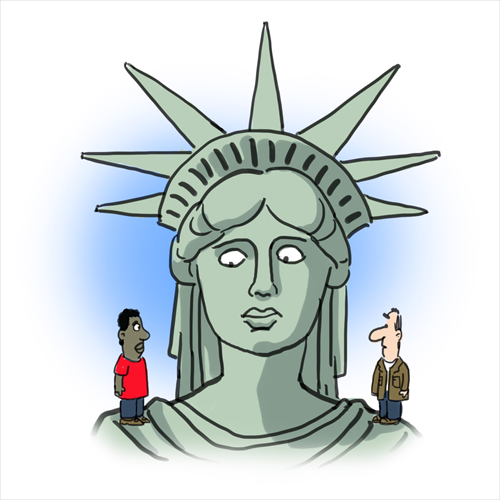 Get off at the last stop — Beijing Subway in vision
Get off at the last stop — Beijing Subway in vision
 Top 100 beauties in the world!
Top 100 beauties in the world!
 Gallery: Who is the most beautiful one?
Gallery: Who is the most beautiful one?
 If you like autumn, put your hands in the air!
If you like autumn, put your hands in the air!
 Fan Bingbing's "Queen style" in new play
Fan Bingbing's "Queen style" in new play
 Lingerie show at 2014 Miss China
Lingerie show at 2014 Miss China
 J-10 fighters show aerobatic stunts in smog-free sky
J-10 fighters show aerobatic stunts in smog-free sky
 Charming contestants of Shanghai Int’l Model Contest
Charming contestants of Shanghai Int’l Model Contest
 Most amazing chi-pao beauties
Most amazing chi-pao beauties
 7 deadly animal attacks
7 deadly animal attacks

Illustration: Liu Rui/GT
The moment officer Darren Wilson ordered Michael Brown to move from the roadway to the sidewalk, a program of events dramatizing race relations in the US broadcast itself to the nation from streets of the St. Louis suburb of Ferguson, Missouri.
For Wilson, this was a routine incident gone bad after Brown allegedly attacked him and he responded with deadly force.
For the African-American community and many other Americans though, at issue was the horrific loss of a young life; yet another African-American man lay dead at the hands of a white policeman, the latest symptom of a larger, social disease from which the white US is largely immune via its tonic association with institutional power.
Though a grand jury declined to indict Wilson in the wrongful death of Brown on the basis of a perhaps deliberately weak prosecution case and unchallenged forensic evidence that was presented as supporting Wilson's testimony, there remains outrage in Ferguson and throughout the US about a system of policing that disproportionately stops, arrests, and kills black citizens.
In fact, Ferguson's police department arrests blacks at about four times the rate it arrests whites, and statistics show that as more blacks moved into the city and fewer whites remained, the ratio became increasingly severe.
Although the relative percentage of black arrests is higher in Ferguson than in Missouri as a whole, and greater than the national average, FBI crime data shows nearly 1,600 municipalities in the US arrest blacks at higher rates than Ferguson does.
In other words, Ferguson could have been many other US towns, and the city's problems are not merely local, but linked to a national demographic trend.
In the 1960s and 1970s, the US experienced "white flight" from many urban neighborhoods, and race riots erupted in Detroit, Newark, New Jersey and elsewhere.
Yet, more recently, demographic trends have reversed and, as affluent whites move back into large cities, poorer and disproportionately minority populations have moved to the suburbs in search of housing, education, and jobs, with racial tensions once again flaring.
These population shifts suggest, despite much legal progress over the past half century, communities of whites and blacks often remain segregated within the US.
And in Ferguson, the rapidity with which whites moved out of the city as blacks moved in provides poignant context for the difficulty a nearly all-white police department has had in attempting to police a nearly all-black city.
While studies show cities that elect minority mayors are more likely to have more diverse police forces and, in turn, such forces are often less likely to treat African-Americans unfairly, there are many reasons why this is not so easily accomplished in places like Ferguson, where blacks outnumber whites by a ratio of 4 to 1.
The lag time between population shifts and local elections, extremely low voter turnout, and the prevalence of white-owned businesses all serve to consolidate power in the hands of remaining whites, at the expense of the interests of newly arrived, and often poorer blacks.
Such institutional racism is seemingly legitimate, as it may break no laws, and perhaps not malicious, but it nevertheless prevents black citizens from having a fair say in the governance and conduct of their own hometowns.
When he encountered Wilson, Brown was jaywalking, and he had smoked marijuana and stolen a few cigars. He was also a teenager who had just graduated from a segregated high school so poor its students shared two graduation gowns. And he was planning to attend college before being shot dead on an August afternoon in Ferguson by a police officer who claims to have feared for his own life. It could have happened in many other places.
Until the US can collectively disentangle issues of class and race to the point of accepting African-Americans as not merely equally endowed citizens, but rather as social peers, fear and bias will remain subtly entrenched in towns across the country, and African-Americans will continue to be oppressed by a majority that sees itself as merely following the law.
The author is a freelance writer and political observer living in Columbus, Ohio. opinion@globaltimes.com.cn
(For the latest China news, please follow @PDChina on Twitter at http://www.twitter.com/PDChina and @PeoplesDaily on Facebook at http://www.facebook.com/PeoplesDaily)
 HK majority will decide fate of protests
HK majority will decide fate of protests Guangdong officials rob graves to meet monthly cremation targets
Guangdong officials rob graves to meet monthly cremation targets A home for all seasons
A home for all seasons GT Leader Round Table discusses reform and growth
GT Leader Round Table discusses reform and growthDay|Week|Month